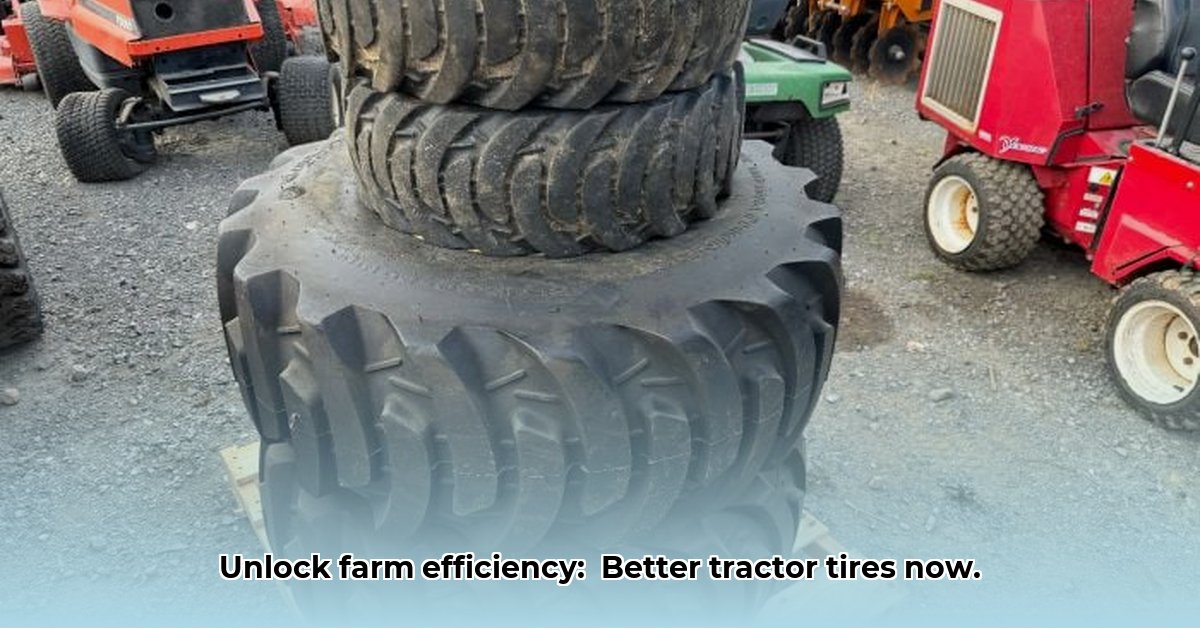
Choosing the right tires for your John Deere tractor is a crucial decision impacting fuel costs, soil health, and overall farm profitability. This guide helps you select, maintain, and manage tires effectively, boosting efficiency and sustainability. For more tire size information, see this helpful guide: Tire Size Guide.
Understanding the Importance of Tire Choice in Sustainable Agriculture
Your tractor tires play a vital role in sustainable farming. The right tires significantly reduce soil compaction, leading to better crop yields and healthier soil. Efficient tires also lower fuel consumption, reducing operating costs and your environmental footprint. Isn't minimizing your impact on the land while maximizing your profits a worthwhile goal? This isn't just about saving money; it’s about building a sustainable farming operation for the future.
John Deere Tire Options and Considerations
John Deere offers a wide range of tires engineered for different soil conditions and farming operations. Their options include specialized tires for row crops, heavy-duty tires for hauling, and tires designed to minimize soil compaction. These advanced tires often incorporate technologies to boost fuel efficiency and extend tire lifespan. Consider these key features:
| Feature | Benefit | Considerations |
|---|---|---|
| Low-Pressure Tires | Reduced soil compaction; improved fuel economy | Best for soft soils; may require more frequent air pressure checks. |
| High-Load Capacity Tires | Increased load-bearing; enhanced durability | Ideal for heavy hauling; might increase soil compaction. |
| Specialty Tires | Optimized for specific tasks (e.g., narrow row crops) | Carefully match tire type to your typical work for optimal performance and longevity. |
Choosing between these options depends on your priorities. If minimizing soil compaction is paramount, low-pressure tires are ideal. If heavy hauling dominates your work, high-load-capacity tires provide the needed strength. Specialty tires excel when specific tasks, like narrow-row planting, are your focus.
Exploring Aftermarket Options (Green Farm Parts and Others)
Aftermarket tire brands, like Green Farm Parts, often offer lower initial costs. However, carefully weigh the potential trade-offs. While the upfront savings may seem appealing, reduced durability and shorter lifespan could lead to more frequent replacements, negating any initial cost advantages.
Pros of Aftermarket Tires:
- Lower initial cost: Potentially significant savings for budget-conscious farmers.
- Wider availability: Easier access to less common sizes or in specific regions.
Cons of Aftermarket Tires:
- Reduced durability and lifespan: May require more frequent replacements.
- Warranty implications: Using non-OEM tires might void or impact your tractor warranty.
Before considering aftermarket options, research the brand thoroughly. Always consider potential long-term costs and warranty implications. This cost-benefit analysis should be a primary driver in your decision making.
Practical Guide to Tire Selection and Maintenance
Selecting the right tires is a multi-step process. Follow these steps for optimal results:
- Assess your farming operation: Soil type, load weights, annual tractor hours—these factors are vital in selecting the right tires.
- Check your tractor's specifications: Consult your owner's manual for recommended tire sizes and load ratings and don't deviate from these standards.
- Compare tire options: Evaluate both John Deere and reputable aftermarket options, comparing initial cost, expected lifespan, fuel efficiency, and soil compaction impact.
- Make your informed decision: Balance performance needs with total cost of ownership over the tire's entire lifespan for the best return on investment.
Proper maintenance is crucial to extend tire lifespan and maximize efficiency:
- Regular inflation checks: Maintain recommended pressure using a reliable gauge. Underinflation significantly increases fuel consumption and wear.
- Visual inspections: Regularly inspect tires for cuts, punctures, and uneven wear. Early detection helps avoid larger, more costly repairs.
- Tire rotation: Rotate tires regularly to distribute wear evenly, maximizing their lifespan.
Long-Term Tire Management Strategies
Long-term planning is essential for sustainability and cost-effectiveness. These strategies help maximize tire lifespan and minimize environmental impact:
- Tire retreading: Extends tire life, reducing waste and saving money. Remember, this is a smart, economical approach.
- Proper tire storage: Store unused tires in a cool, dry place away from sunlight and extreme temperatures to prevent premature deterioration.
- Sustainable disposal: Dispose of worn-out tires responsibly. Contact your local waste management authorities for proper recycling or disposal options.
Investing in the right John Deere tractor tires and employing effective management strategies ensures sustainable and profitable farming. The right tires are an investment in both your farm's future and the environment.